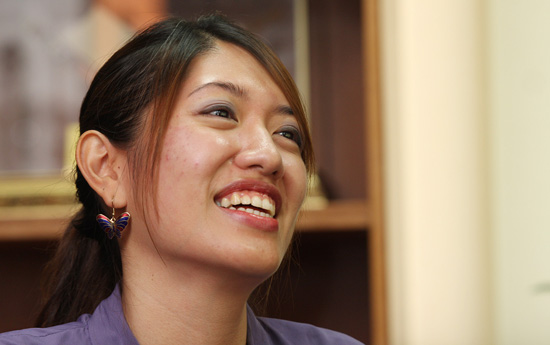
TRICIA Yeoh is not one to shy away from a challenge. Despite being warned that joining the state government would not be smooth sailing, the 28-year-old took on the job of research officer to Selangor’s Menteri Besar Tan Sri Khalid Ibrahim in January 2009.
Yeoh has been at the forefront of public policy discourse since completing her Masters and joining Asli’s Centre for Public Policy Studies (CPPS) in 2006 as a research analyst. She has become a familiar face at public forums, often speaking about the need for national unity, good governance and better implementation of democratic principles. Yeoh was appointed CPPS director in 2008, filling the shoes of former director Dr Lim Teck Ghee, who resigned in 2006 in protest over a corporate equity ownership report. She remains on CPPS’s advisory panel.
Yeoh says despite the challenges in her current job, she has learnt a lot about how government works from the inside. “Having written and analysed policy issues from the outside for a while, taking up the job with the Selangor government allowed me an opportunity to put those ideas into action. It gives me a chance to be part of demonstrating an alternative to running the country, that good governance is possible,” Yeoh says in an 8 June 2010 interview at her office in Shah Alam.
TNG: Where were you born and where did you grow up?
Tricia Yeoh: I was born in Singapore in 1982. I grew up in different parts of Petaling Jaya – SS2, Taman Megah. I still live in Petaling Jaya now, so I guess I’m very much a Selangor citizen. I went to primary school in Sekolah Rendah Taman Megah and then to Sri Aman Girls’ School in secondary school.
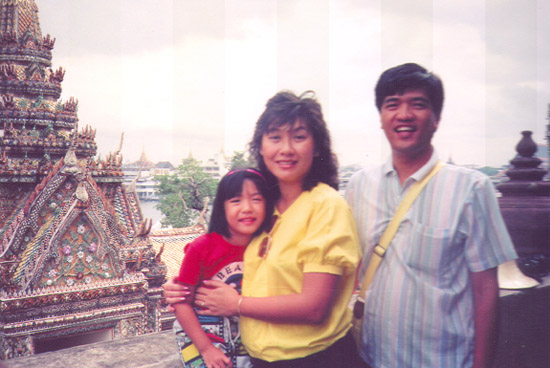
What are some of your strongest memories of the place where you grew up?
I remember the neighbourhood playground in Taman Megah well. It’s where all of us who lived nearby would come together, even those from different schools. We had a lot of social activities there – playing with candles and lanterns during the mooncake festival, for example. There were really huge trees with big roots, so whenever it rained, we would splash around in the puddles formed by the roots.
Everything centred around the neighbourhood – there was an ethos of sharing, knowing each other well. There were many different races … it was very communitarian. Every evening, we would congregate. We would play on the streets, play badminton, go cycling, play basketball, five stones or getah. I don’t know whether children do these sorts of things nowadays.
I think it’s important to create such public spaces. At the end of the day, neighbourhoods and communities are where social interaction takes place. Where people draw their perceptions about different races and religions. If friendship and interaction doesn’t start at a young age, then once you grow up into teenage and adulthood, certain impressions would already be formed.
Can you trace your ancestry?
My maternal great-great-grandfather came to Malaya from Swatow in China to work as a coolie at a godown, carrying gunny sacks of rice. He put his son, my great-grandfather, into a Peranakan home to work as a servant.
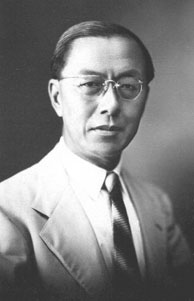
My great-grandfather, Ng Seo Buck, or NS Buck as he preferred, was very bright; he picked up languages and cultures easily. He learnt Malay in the Peranakan family and English in school, and in fact spoke English with a clipped British accent. He was so particular about speaking good English that whenever his grandchildren wrote letters to him, instead of replying, he would return their letters with grammar and spelling errors marked in red.
He eventually became a teacher and [school head] at Kajang High School, and was temporary [school head] at Victoria Institution at one time. He also learnt Japanese and worked as an interpreter when the Japanese came.
On my mum’s side, my great-grandmother and her parents came from Java to Singapore, bringing with them a lot of Javanese kebaya and beaded shoes. They integrated with the Peranakan in Singapore as they had similar languages and culture. The maternal influence is strong in Peranakan familes. Our family is Peranakan due to my great-grandmother’s influence. We have never spoken Chinese as a family, and we’ve always worn kebaya. Even for Chinese New Year and Christmas, we eat nasi lemak and Peranakan food like sayur lodeh.
On my dad’s side, they also came from China and they landed in Perak. They were involved with brick making and tin mining. My paternal grandfather was a police officer and became the Assistant Superintendent of Police (ASP) in Ipoh, quite rare in those days for a Chinese in public service.
Are there any stories that you hold on to from your family?
The Peranakan side of the family strikes a chord with me. Not just as a person, but also my vision for Malaysia. For a long time, I wondered why I didn’t really feel Chinese. I went through this identity crisis about why my family didn’t teach me Chinese. When I went to the UK for studies, my Chinese friends were celebrating the winter solstice festival and eating “tang yuan”. I asked, “What is that?”, and they were shocked. They asked, “How can you not know about this? Are you Chinese?” Questions like that made me think, “Oh, what am I then?”
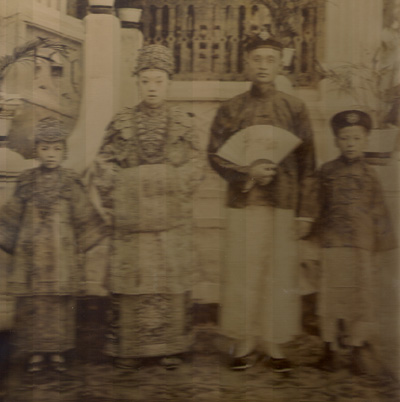
I thought I had to learn Chinese culture, listen to Chinese songs, learn the language. Later, I realised I didn’t need to push myself into a mould or be ashamed of not fitting a stereotype [that others imagined of the Chinese]. My family and I have lived all these years in Malaysia, and my identity is precisely that – it’s precisely Malaysian. I speak and dress Malay more comfortably than Chinese, and again, it’s not something I should be ashamed of because that’s who I am.
That’s the beauty of it, we’re a multitude of different people. Just because you look a certain way doesn’t mean you must behave a certain way. I do celebrate Chinese New Year, but with a different flavour, a different lens. That’s how history is; culture changes with the times, or is interpreted and reinterpreted according to families and geographical location.
The same is true about how Chinese I am. I wish Chinese [Malaysians] understood that there are different types of Chinese. Sometimes, they can be as culturally ethnocentric as the other races they criticise.
How do you connect to these stories as a Malaysian?
[My ancestors have a history of being open to possibilities and challenges.] One grandmother escaped to India during the war. Her father, a doctor, gave medical treatment to local Indians. They returned to Malaya with a love for Indian movies, music and food.
My grandfather escaped to China by trekking from Hong Kong to Chungking, passing through Kunming, Shanghai and Burma and doing odd-jobs. One of my great-grandfathers was a Chinese Kapitan (head of the Chinese clan) who travelled from Fuchien, China to Labuan and then to Malaya. There’s always been this fighter spirit in my family. New cultures, new languages have never been a problem. Hopefully, I have inherited the fighter spirit, too.
I appreciate the different journeys my ancestors took to get me where I am, to get us here. It makes me more aware of how I lend my time and my life into this part of history. Especially in a Malaysia which is [struggling at a crossroads].
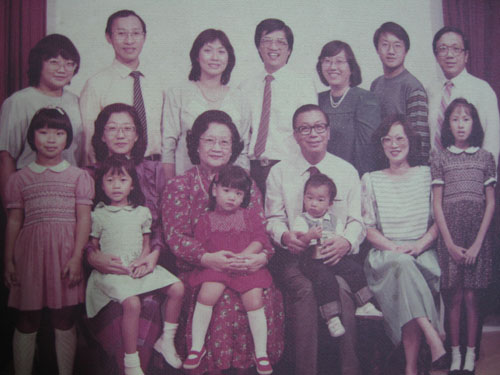
Describe the kind of Malaysia you would like for yourself and for future generations.
I feel that as children, we’re born into a country which is so rich with beautiful things. Your teachers tell you good things about the country in moral or religious classes. You have co-curricular activities with different races. This was my experience, there were no problems.
And then, children grow up, and at university or pre-university, thoughts suddenly creep in about how we’re treated unequally. And then, to be dramatic about it, the torrent of dirt just descends upon them as they become exposed to the realities of Malaysia. They realise that there are things not right with the country. And it is that moment of awakening which is the saddest part of someone’s life. Everything you’ve been taught is challenged.
I want a day where that moment of rude awakening doesn’t happen, whatever race, religion or socioeconomic background you come from. I would like to see a Malaysia where everyone can continue feeling fully accepted as 100% Malaysian based on their citizenship. ![]()
[related-posts]
Read other Found in Malaysia interviews
The Nut Graph needs your support


mkat says
Taman Megah? Hmmm, this young lady grew up in the same area as me, and we both went to the same primary school at the same time!
Funnily enough, I don’t recognize her…
Dr Syed Alwi says
Unity in diversity and NOT Malaysian Malaysia. The Malays have a different culture, religion, value-system etc from you. You cannot therefore represent Malay interests. Whether you like it or not – Malaysia will always be divided along ethno-religious lines.
Pei Ling says
“Malaysia will always be divided along ethno-religious lines.”
That’s your personal opinion, please don’t impose it on 28 million Malaysians, thank you.
Dr Syed Alwi says
Sorry Pei-Ling – its NOT a personal opinion; it’s a demographic reality. You mean to tell me that the Malay-Muslims and the non-Muslims have the same culture, religion, values, aspirations etc? Dream on! You have to accept Unity In Diversity – because you cannot homogenise Malaysia. That’s the harsh political reality of Malaysia and Singapore. It’s very painful to accept. But there is no other alternative. We must celebrate our diversity. We must learn to live with it.
mkat says
“You have to accept Unity In Diversity – because you cannot homogenise Malaysia. That’s the harsh political reality of Malaysia and Singapore.”
Sorry!!?!? Come again?
Malaysia was a melting pot of races and religions but was fairly adept at setting aside race and religion before the ultras in Umno made it their personal mission to hold onto power at the cost of tearing the fabric of the nation apart.
Even in Sarawak and Sabah, it is still fairly homogeneous. Mixed marriages without conversion are very common, and people of different faiths and cultures have no problem mixing and eating with each other.
Dr Syed Alwi says
Dear mkat,
You cannot homogenise Malaysia because Islam comes in the way. Muslims cannot simply marry someone of another religion.
I think that you have totally ignored the role of Islam in the Malay [Malaysian] community. Malay [Malaysians] are mostly conservative Muslims and you have to accept that reality.
That is why a Malaysian Malaysia and a Singaporean Singapore can NEVER materialise. Islam is what divides us.
Wilson Wong says
If I may Dr Syed Alwi,
‘Unity in diversity’ is a social concept enforced by political policy. Hardly natural, but really just an artificial social construct.
So when people say that they are supporting ‘unity in diversity’, what really occurs is that they are supporting a political ideology.
I don’t have a doctorate (yet), but I find your capitalization of letters in your words uncouth.
Dr Syed Alwi says
Dear Wilson Wong,
Do you honestly think that the Malay [Malaysians] will give up Islam and be homogenised with the non-Muslims? Tell me – what do you think is the role of Islam in the Malay [Malaysian] community ?
Malay [Malaysians] are conservative Muslims mostly. They will NOT sacrifice their Islamic identity just to blend into an unknown, non-Muslim, Malaysian Malaysia.
Unity in Diversity means that each and every ethnic group gets to keep its identity and in return – MUST accept the social contract of 1957.
Wilson Wong says
Dr Syed Alwi,
With all due respect, you did not understanding what I was articulating. You do not seem to be doing justice to your credentials as a doctorate.
First. My point was that ‘unity in diversity’ is an artificial social construct, just as ‘Malaysian Malaysia’ is also an artificial social construct.
Second. I find, again, with your common habit of capitalizing letters in your words to be uncouth and now even downright irritating. Did you capitalize your letters when you authored your academic papers?
Dr Syed Alwi says
Dear Wilson Wong,
Is Islam an artificial construct ? The reality is that the Malay Malaysians – indeed almost all Malays – are conservative Muslims. They will not accept a homogenisation of society that will imply a dilution of Islam.
You can wait till the cows come home – but you will never get anywhere with this line of thinking. Why? Because it does not address the issue of Islam in Malaysia. Think about it. Malay [Malaysians] are not going to give up political control of Malaysia as that would mean a shift in geo-politics away from Muslim dominance in Malaysia. Malaysia is a Muslim country and is that also an artificial construct ?
Jamie says
Dr,
I think what Wilson means is BOTH the term “Malaysian Malaysia” and “unity in diversity” are really just useless terms. They make good campaign lines and all, but really the issue of nation building is much more than ideals and catchy slogans. With this, Wilson is merely saying they are both equally ‘artificial’.
—————————–
Having said that, there is no where in the constitution/written laws/bills that explicitly states Malaysia is a Muslim state. I mean, think about it… if there were, we wouldn’t have two sets of laws- we would have just one.
—————————–
But is the constitution everything? No, not really…. you would argue the reality is we have more Muslims in Malaysia than any other religions (at this point, let us separate race from religion).
That’s true… But does that mean we are an Islamic state? No. It simply means the majority of the population are Muslims.
For example, if New York were a separate nation-state by itself, would that mean it is an ASIAN state seeing that the majority are Asians? No…. it just means the majority are Asians.
Wouldn’t you like to know what will happen when the proportion of whites to minorities in America flattens out, and whites will no longer be the majority? That’s going to happen soon…. Will they still have affirmative action? How about the constant struggle between the separation of church and the state?
The only way America can fix it is to move towards a secular state. This is also the only way Malaysia can ‘fix’ its (increasingly) rojak population: Move towards secularism.
————————-
Another worrying assumption you seem to hold is that ALL Malays are conservative Muslims. This is NOT true. I’m sure you have seen Malays in pubs and clubs from time to time. I’m also certain you have heard of Malays breaching intimacy boundaries. My question to you is: How certain are you ALL Malays are (1) Muslims (2) conservative Muslims?
Answer: you can never be sure.
————————-
What you can be sure is- Islam is less accommodating than secularism. In this globalized world, we would need to be more accommodating to avoid being mowed over.
Our nation isn’t self-sustaining. We’re bringing in migrant workers- the Christian Filipinos, Muslim Indonesians, Taoist Vietnamese, Buddhist Burmese…
Now, we can sit here and whine about who should get affirmative action, are we an Islamic state, bla bla….
Truth is we can’t stop globalization… your ‘conservative Muslims’ are going to be hit hard with a wave of new cultures. You can police all you want and catch all the Malay dancers in clubs, but when it comes… Even moral policing can’t stop it. Only those who are fervent in faith can withstand the wave of globalization.
Farouq Omaro says
Malaysia is divided along ethno-religious lines because of politics. In many parts of Malaya prior to the Japanese invasion, there were huge number of Peranakan families, who dress, speak and eat like Malays. Mixed marriages between people of different religions were tolerated. Resistance to the Malayan Union, political squabbles and the need to scare certain sections of society to remain in power have divided us. Unfortunately, this Malayan division is slowly finding its way to Sabah. Just read what Kalabakan MP Datuk Ghapur Salleh said recently with regards to the Merotai seat held by LDP.
Malaysian says
There seems to be an inconsistency in your argument. You said “unity in diversity” yet you also claim that Malaysia will always be divided along ethno-religious lines. Which is it now? Unity or division?
You are Singaporean. You therefore cannot represent Malaysian interests.
Dr Syed Alwi says
Dear Malaysian and Farouq Omaro,
Please tell me and all of Malaysia, what are the features and characteristics of this so-called Malaysian Malaysia ?
Is pork halal? Is tutup aurat a matter of choice? Is foreign policy to be free from Islam? And so on. Please spell out in detail what Malaysian Malaysia means.
Unity in Diversity means that each ethnic community gets to keep its identity – and in return – MUST respect the 1957 social contract.
Jamie says
It is also interesting that we’re supposed to adhere to the 1957 social contract.
I wasn’t born yet. Should I be agreeing to contracts my forefathers signed? (well, since we don’t practice direct democracy, I doubt my forefathers signed it).
But beyond that… Why is it we can amend our constitution, but we cannot amend a 1957 contract?
Is it set in stone? No.
——————–
What identity? I grew up playing soccer with my Malay friends who skipped school with me. I made ketupats for our class raya parties.
I never burned paper money during hungry ghost festival- I’m a Christian.
I ate with my hands in school.
—————
What identity? The Malay Minangkabau is entirely different from the Malay Peranakan culture.
What identity? Half of Sabah’s population came from Siam… Half of West Malaysia came from Jawa.
—————
I’ll tell you what we have in common as our ‘identity’- we’re Malaysians. That’s it.
Rhan says
“Sometimes, they can be as culturally ethnocentric as the other races they criticise.”
To expect a Chinese to know Chinese culture is ethnocentric? Hmmm….interesting. Can Tricia elaborate more what she mean by “the other races they criticise“ and what the perspective the criticism towards other races is about?
If Tricia wishes to be less Chinese, it is her choice, she is free to do what she wants, is that not what every Malaysian is looking forward? So can the “different type” of Chinese feel free to do what we want and not get discriminated?
Calvin C says
I had earlier sent a twitter message to Tricia my opinion of the interview, stating that it speaks to Malaysians. There was a comment from one from a fellow Malaysian asking me in return what do I mean exactly? I replied that we didn’t know we were different until we left school.
Allow me then to elaborate and share my experience here.
When I was growing up in Bukit Mertajam during the late 70’s and 80’s, I was fortunate to have neighbors, friends and family friends who were Malay, Indians, Chinese and Sikh [Malaysian]. In school, we mixed freely and forged lifetime friendships till this day. Outside of school we used to play sports and hang out together in our playground, attended the same tuition classes, shared the same food, spoke the same language and had the same interests.
Our friends and neighbours’ parents were also our “parents”. We would eat, studied and be disciplined in their houses and likewise. Hari Raya, CNY, Christmas, Divali, etc were causes of genuine celebration and respect for each other, with open houses and often sending and receiving of kuih muih and other special delicacies unique to each celebration.
So, little wonder we all had a rude awakening as we left school and prepared for university and in the course of higher education – we were told we were different, even more so when we joined the working force and became taxpayers. The polarization today is unbecoming of a progressive nation.
Today, most of my childhood friends are overseas and mostly successful, yes, even the ones today we know of as bumiputra.
simplicity says
My English is rather simple (reading all the comments with so much political language in it made me think numerous times whether i should actually write here)…
Well, I had a similar experience with Calvin [during my] schooling days. I really enjoyed my school days. When I was a kid, there was a Malay [Malaysian] family [with whom I would] go to the park to slide down the hill on cardboard boxes.
When I went to secondary school, I sat next to a Malay [Malaysian] girl and I never questioned why she wore a tudung but simply just figured out that that’s her uniform. We talked about boy crushes, assignments, teachers, exams, and would nudge each other if someone fell asleep in class. I never thought of her as being different from me.
After SPM, I had to do STPM, simply because my parents couldn’t afford a private college education. That’s when all these policies about matriculation vs STPM got me thinking, “Aren’t we the same?” Well, it was all the way until that day [when I learnt about] segregation policy. I will never understand why we need this kind of policies but anyway, I manage to (lucky me) get into UKM which I thought of as a little pro-Malay. But you know, it’s not true!
While they might be enforce dress codes and stuff, I think that’s fine. Anyway, why would we want to host a daily fashion show in an educational institution?
So, when I was in UKM, most of my classmates were Malay [Malaysian] (about 80%) and we got along simply well. I was only singled out by Chinese [Malaysian] conservatives (those who can speak Mandarin so smooth like Taiwan talkshows and dramas) for mixing too much with Malay [Malaysians] and for speaking Bahasa Malaysia and English. I went to a Chinese[-language] primary school and studied Mandarin until PMR and I’m no less Chinese [Malaysian] than I already am! Aku mata sepet lah…
When it came to assignments, it has to be completed in Malay but reading materials are all in English (seriously, the language reforms by Muhyiddin has to be reconsidered!) and my friends usually have a bit of a challenge with it. I would help them but there was never ever any trace of discrimination like “No wonder English so bad lah, only know your own Malay language” or “Budak tu ingat dia mat salleh ke? Belajar bahasa si penjajah tu”. I always thought that’s just because I was brought up in the city and filling my time with American TV and music whereas they, due to their environment, [could] only practice/do/achieve whatever they had within their environment. I encouraged my Malay [Malaysian] friends to read English books, request for presentations to be done in English from our lecturers and what did we get in return? Friendship and a BIG practice of how to speak the lingua franca of today.
What I’m trying to bring out here is that we only drive ourselves to differentiate each other when we [politicise things]. We can’t really blame the government for today because policies that were agreed in the past take quite some number of years [for flaws to be visible].
It takes a long time to notice a problem, and change will be an ongoing process. Well, if we look at Korea compared to us, they might have an edge over us because their citizens are not as diverse as ours where we have a lot of parties to please.
So whether that special rights thing was wrong or not and things like that, I don’t think [we should] question what our fathers did in the past. It’s for us to find common ground and understanding of how we can push for change through our individual contributions to society, be it small or big.
As for Dr. Alwi, I do not want to step on your toes, but simply stressing the fact that there’s this difference in Islam that Malays have to uphold and that the migrant minorities have signed some social contract and those things … it all becomes [politicised]. I felt that religion is not to be mixed with race. I travel a lot for my work and when I speak to my Muslim colleagues from other parts of the world, they were surprised that being Muslim is embedded in our Federal Constitution. Again, one’s environment plays a whole big part of your life when choosing life’s path be it your social, spiritual, or professional life. Probably there may be the point of view that some Malay [Malaysians] are very conservative. But if from a young age they were not told that they were Malay and [therefore had] to be Muslim, there could be a difference. I am not saying that they will turn to other faiths.
Raymond says
Dr Alwi,
Despite the vicissitudes of Malaysian history that had forced people to take sides, there were, and still are many groups in the country which straddle religious and ethnic divides, like the Peranakan. They are neither Malay nor really Chinese, so how do you pigeon-hole them? Their few numbers do not help in placing them firmly in our segregated space.
Instead of putting down people like Tricia who does not buy the Malaysian political idea of ethno-religious segregation, we should applaud them for wanting and willing to make Malaysian a more unified and harmonious country instead. We are not limited by circumstances; rather, we as human beings can be resourceful enough to change things for the better.
Tricia’s friend,
Raymond Woo
Dr Syed Alwi says
Dear Raymond,
And do you think that Islam allows such a homogenisation? The problem with your argument is that it totally ignores the role of Islam in Malay society. No reference to Islam at all! Malays are mostly Muslim conservatives and will not sacrifice Islam.
Rhan says
Dr Alwi,
May I know which the feature and characteristic of the 1957 social contract? Do you think Malaysians including those in power respect the core spirit and contents of that contract?
Rhan says
“We are not limited by circumstances; rather, we as human beings can be resourceful enough to change things for the better.”
How? By being less Chinese or more Western?
chinhuatw says
@Dr Syed Alwi and others,
Malaysia will never be homogenous and should not be. But ethno-religious differences need not be politicised let alone [be] the only cleavage between us.
I don’t believe in the myth of unity. What I long for is diversity that would allow us to choose who we want to be. No, Malay [Malaysians] need not be like Chinese [Malaysians], or vice versa. I will stand up for the right for a Chinese [Malaysian] to learn and speak Chinese, and also the same right for a Chinese [Malaysian] not to learn and speak Chinese. Each to his/her own.
There should be no one to tell us how we should live our lives as long as we do not impose our preferences on others. Learning or not learning a particular language may have its benefits and costs, but it should be left to individuals as far as possible.
Dr Syed Alwi, you like to talk about the “social contract”. In its original meaning, the contracting parties are individual citizens and the state. Both are entities without doubt. And you need such a contract because the state imposes involuntary membership (either as citizens or subjects) on the residents on the land it claims. Without such contracts, the state would be just a sheer product of “organised crime”, like the mafia which also impose their rule on their subjects.
Would you kindly enlighten us – who were the contracting parties in 1957? Were the Malays, Chinese and Indians legal entities to enter a contract? Are you and other opponents of the “Malaysian Social Contract” suggesting that Umno, MCA and MIC – indeed legal entities – were the contracting parties and that the Malayan state was a product of their contract, and not that of a contract between Malayan citizens and the state in the form of Constitution?
Dr Syed Alwi says
Dear Chin Huat,
Yes – it IS in reality a gentleman’s contract between the representatives of the various ethnic communities back in 1957.
Of course you will bring in the Constitution etc. But even Singapore does NOT follow the letter of the Constitution. Indeed LKY himself would say that the Westminster model is somewhat tricky to enforce on a society whose norms and culture differ from the Post-Enlightenment West.
Indeed LKY often speaks of “Asian Values”. The Parliamentary system based on the Westminster model – may NOT be the ideal for South East Asia – given that SEA has a vastly different cultural DNA and a vastly different history.
The Westminster model is what we get after centuries of colonial governance and imperialism.
We are now in a transition period of world history. The rise of Asian powers like China and India, etc, may spell a different political future for Asia…
chee says
For once I agree with the Doctor.
It’s the other way around.
Muslim-Malaysians are trying to homosexualgenise all the other races with Islam.
Allahuakbar!!!
-chee